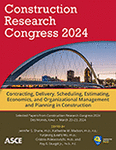Evaluating Vulnerability to Uncertainty in Human-Robot Collaboration: A Case Study in Drywall Finishing
Publication: Construction Research Congress 2024
ABSTRACT
Construction projects are exposed to high levels of logistical uncertainty like material shortages, power outages, and unpredictable weather events. Proactive planning around these uncertainties is complicated by the many resource interactions and interdependencies needed for the completion of most construction tasks. Exposure to uncertainty and a high sensitivity to that uncertainty makes project schedules more vulnerable to delay. The application of human-robot collaboration (HRC) in construction tasks has the potential to reduce uncertainty related to labor but may increase vulnerability in other unexpected ways. This paper explores how HRC in a subset of construction tasks, specifically in drywall finishing, affects project vulnerability to simulated disruptions. Data from jobsite observations and worker interviews are used to develop a meta-network model of the drywall finishing process, which is integrated a semi-automated robot named “Canvas” in an HRC application. The results identify the circumstances under which HRC in drywall finishing makes the project more or less vulnerable to uncertainty. The findings of the research will aid project managers by enabling more resilient planning of HRC applications and provide guidance to robotic manufacturers improving the integration of their systems on construction projects.
Get full access to this article
View all available purchase options and get full access to this chapter.
REFERENCES
Abdelgawad, M., and A. R. Fayek. 2010. “Risk management in the construction industry using combined fuzzy FMEA and fuzzy AHP.” J Constr Eng Manag, 136 (9): 1028–1036. American Society of Civil Engineers.
Akinlolu, M., T. C. Haupt, D. J. Edwards, and F. Simpeh. 2022. “A bibliometric review of the status and emerging research trends in construction safety management technologies.” International Journal of Construction Management, 22 (14): 2699–2711. Taylor & Francis.
Assaf, S. A., and S. Al-Hejji. 2006. “Causes of delay in large construction projects.” International journal of project management, 24 (4): 349–357. Elsevier.
Bademosi, F., and R. R. A. Issa. 2021. “Factors influencing adoption and integration of construction robotics and automation technology in the US.” J Constr Eng Manag, 147 (8): 04021075. American Society of Civil Engineers.
Brosque, C., J. T. Hawkins, T. Dong, J. Örn, and M. Fischer. 2023. “Comparison of on-site and off-site robot solutions to the traditional framing and drywall installation tasks.” Construction Robotics, 1–21. Springer.
Carley, K. M., J. Pfeffer, J. Reminga, J. Storrick, and D. Columbus. 2013. ORA user’s guide 2013. Carnegie-Mellon Univ Pittsburgh PA Inst of Software Research Internat.
Carley, K. M., and J. Reminga. 2004. Ora: Organization risk analyzer. Carnegie-Mellon Univ Pittsburgh PA Inst of Software Research Internat.
Francis, A. 2017. “Simulating uncertainties in construction projects with chronographical scheduling logic.” J Constr Eng Manag, 143 (1): 04016085. American Society of Civil Engineers.
Kim, Y., H. Kim, R. Murphy, S. Lee, and C. R. Ahn. 2022. “Delegation or Collaboration: Understanding Different Construction Stakeholders’ Perceptions of Robotization.” Journal of Management in Engineering, 38 (1): 04021084. American Society of Civil Engineers.
Liang, C.-J., X. Wang, V. R. Kamat, and C. C. Menassa. 2021. “Human–robot collaboration in construction: classification and research trends.” J Constr Eng Manag, 147 (10): 03121006. American Society of Civil Engineers.
Liu, Y., M. Habibnezhad, and H. Jebelli. 2021. “Brainwave-driven human-robot collaboration in construction.” Autom Constr, 124: 103556. Elsevier.
Okpala, I., C. Nnaji, and J. Gambatese. 2023. “Assessment Tool for Human–Robot Interaction Safety Risks during Construction Operations.” J Constr Eng Manag, 149 (1): 04022145. American Society of Civil Engineers.
Smith, N. J., T. Merna, and P. Jobling. 2014. Managing risk in construction projects. John Wiley & Sons.
Wu, M., J.-R. Lin, and X.-H. Zhang. 2022. “How human-robot collaboration impacts construction productivity: an agent-based multi-fidelity modeling approach.” Advanced Engineering Informatics, 52: 101589. Elsevier.
Zhu, J., and A. Mostafavi. 2014. “Towards a new paradigm for management of complex engineering projects: A system-of-systems framework.” 2014 IEEE International Systems Conference Proceedings, 213–219. IEEE.
Zhu, J., and A. Mostafavi. 2017. “Metanetwork framework for integrated performance assessment under uncertainty in construction projects.” Journal of Computing in Civil Engineering, 31 (1): 04016042. American Society of Civil Engineers.
Information & Authors
Information
Published In
History
Published online: Mar 18, 2024
Authors
Metrics & Citations
Metrics
Citations
Download citation
If you have the appropriate software installed, you can download article citation data to the citation manager of your choice. Simply select your manager software from the list below and click Download.
